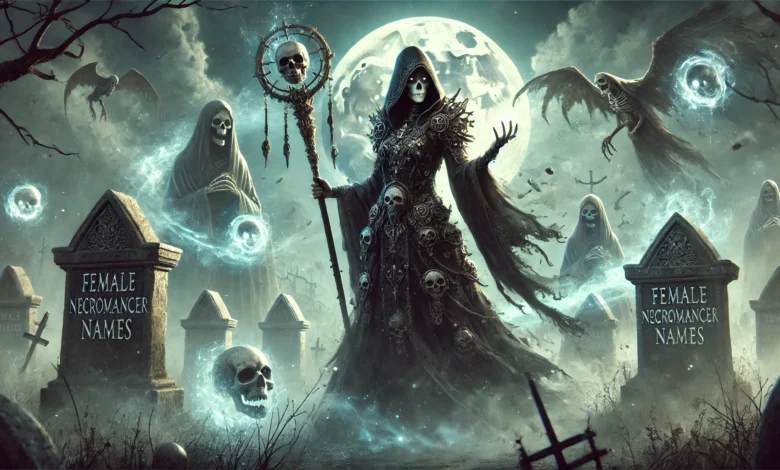Female Necromancer Names – Enchantingly Unique Choices

When it comes to creating memorable and evocative characters, names play a crucial role in setting the tone and establishing their identity. A necromancer, in particular, is a character associated with dark arts, magic, and mystery. In literature, film, and role-playing games (RPGs), necromancers are often portrayed as enigmatic and powerful figures who manipulate life and death, summon the undead, and command spirits. Choosing the right name for a female necromancer can be an important aspect of her character development. The name should reflect her power, personality, and the mystical nature of her craft.
In this article, we’ll explore a variety of unique female necromancer names, and provide insight into how to create the perfect name for your own dark sorceress. Whether you’re a writer, a gamer, or a fan of fantasy, these names will inspire you to craft your own female necromancer character with the ideal blend of mystery and power.
1. Why Choosing the Right Name for a Necromancer Matters
The name you give to a necromancer is not just a random label—it helps to shape the character’s identity and how others perceive her. A name can convey a sense of authority, darkness, and wisdom, or hint at her tragic past and the twisted nature of her powers. It should evoke a sense of mystery, reflecting the character’s control over death and the supernatural. After all, necromancers are often portrayed as figures that walk the fine line between life and death, and their names should reflect this duality.
In addition to their connection to death, necromancers are often seen as outcasts or individuals who wield powers others fear. The right name can also imply that the character has an air of secrecy or danger surrounding her. In many cultures, names hold significant power, and the name of a necromancer could symbolize her command over the dead or her connection to forbidden knowledge.
2. Themes and Origins for Necromancer Names
When creating a name for a female necromancer, it can be helpful to draw inspiration from several themes or origins. Here are a few to consider:
a. Dark and Mysterious Names
These names emphasize the necromancer’s connection to the unknown, darkness, and death. They evoke a sense of danger, power, and intrigue.
- Vespera – Derived from the Latin word “vesper,” meaning “evening” or “night,” Vespera is a name that evokes darkness and the closing of the day. It’s perfect for a necromancer who thrives under the cover of night.
- Nyxara – A combination of “Nyx” (the Greek goddess of night) and “ara,” this name suggests someone who is as ancient as the night itself, with powers to control the darkness.
- Mortis – Derived from the Latin word “mortis,” meaning “death,” this name is a direct connection to the necromantic arts.
b. Names Inspired by Death and the Afterlife
Necromancers often have the ability to communicate with the dead, so choosing a name that reflects this connection to the afterlife can add depth to their character.
- Seraphine – Meaning “fiery” or “burning” in Hebrew, Seraphine is a name that implies an angelic origin, yet with a dark twist. It can symbolize a necromancer who deals with both celestial and demonic forces.
- Elysia – This name is inspired by the Greek term “Elysium,” the peaceful afterlife where heroes and virtuous souls were said to reside. Elysia could be a name for a necromancer who walks the line between light and dark.
- Thanara – Derived from the word “Thanatos,” the Greek god of death, Thanara is a name that’s both beautiful and chilling, perfectly suited for a necromancer who manipulates death itself.
c. Elemental and Nature-Inspired Names
Necromancers often wield the forces of nature, whether it’s the decaying earth, the spirits of the wind, or the cold of winter. Elemental or nature-based names can add an eerie but organic quality to a necromancer’s persona.
- Calyx – The name of the protective outer layer of a flower, Calyx can symbolize a necromancer’s control over life and death—preserving the beauty of life while controlling the decay that follows.
- Isolde – Of Germanic origin, meaning “ice ruler,” Isolde is perfect for a necromancer who has the power to manipulate frost, cold, and the harshness of death.
- Sylvara – Derived from the Latin word “sylva,” meaning “forest,” Sylvara could represent a necromancer whose powers are closely tied to the spirits of the forest and the decay of nature.
d. Names with Dark and Occult Associations
Some necromancers are involved in the occult or have a deep connection to forbidden magic. Names associated with dark rituals, ancient languages, or the arcane can bring a sense of ancient power and mysticism.
- Lilith – A name with roots in ancient mythology, Lilith is often associated with demons, witchcraft, and the occult. It’s a powerful name for a female necromancer who embraces the darker aspects of magic.
- Selene – In Greek mythology, Selene was the goddess of the moon. A necromancer with this name might harness the moon’s power to manipulate spirits or cast dark rituals under its light.
- Belladonna – Named after the toxic plant, Belladonna evokes danger, darkness, and a connection to poison. This name is fitting for a necromancer who is as deadly as she is enchanting.
3. 25 Unique Female Necromancer Names
Here’s a list of unique and enchanting female necromancer names, perfect for your dark sorceress character:
- Vespera Noctis
- Elysia Grimward
- Seraphine Duskborn
- Morwen Darkveil
- Lilith Bloodthorn
- Nyxara Shadowcaster
- Arianna Soulweaver
- Thanara Nightshade
- Isolde Frostmourne
- Ravenna Shadehart
- Selene Thornwind
- Belladonna Vexx
- Calyx Blackthorn
- Sylvara Hollowmoon
- Melantha Darkflame
- Xandria Necroth
- Maelis Deathwhisper
- Zara Obsidian
- Kaelenne Grimfang
- Lucinda Ashfall
- Branwen Mortalis
- Veridiana Shadewind
- Ysolde Bleakbloom
- Vera Soulthorn
- Mirella Voidbringer
4. How to Create a Necromancer Name
If you’re looking to create your own female necromancer name, here’s a simple step-by-step process to get you started:
Step 1: Choose an Element or Theme
Start by deciding what kind of necromancer you want your character to be. Do they specialize in death magic, communicate with spirits, or control the forces of nature? Choose an element or theme that best represents your necromancer’s power.
Step 2: Research Mythology and Language
Research mythology, languages, and words related to death, spirits, and magic. Ancient languages such as Latin, Greek, and Old English often contain words and names that sound mysterious and powerful.
Step 3: Combine Names and Words
Once you have your theme and language in mind, experiment with combining words or parts of names to create something unique. Play around with prefixes, suffixes, and word parts to craft a name that sounds both powerful and mysterious.
Step 4: Consider Sound and Aesthetic
The way the name sounds can influence how people perceive your necromancer. Names that are sharp, dark, or have an ethereal quality often suit necromancers. You might want to avoid names that sound too “soft” or “friendly.”
Step 5: Finalize the Name
Test the name out in different contexts and see how it feels. Does it evoke the right image of power, mystery, and danger? Once you’re satisfied with your choice, you’ve created your perfect necromancer name.
Conclusion
Choosing a name for your female necromancer is an important part of creating a memorable and powerful character. Whether you draw inspiration from mythology, dark themes, or nature, the right name will help shape your character’s identity and give her an air of mystery and authority. From names like Vespera Noctis to Seraphine Duskborn, the possibilities are endless. Use the tips and examples above to help you create the perfect name for your dark sorceress, and bring her to life in your story or game.
Happy naming!




